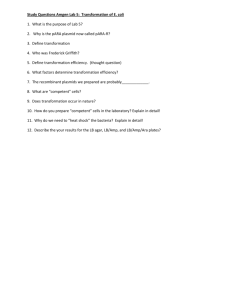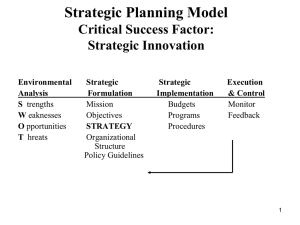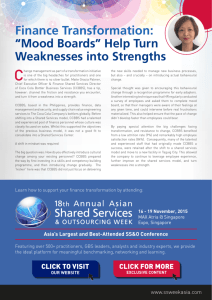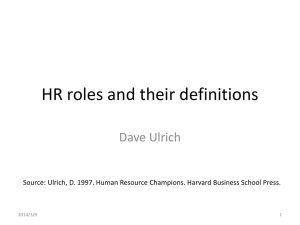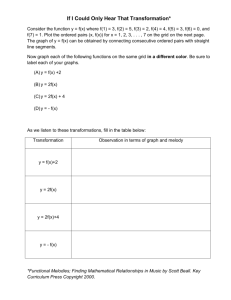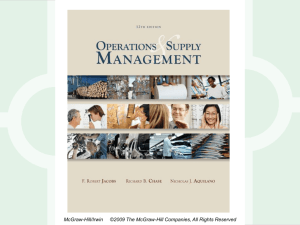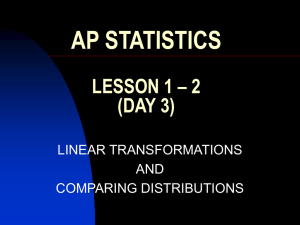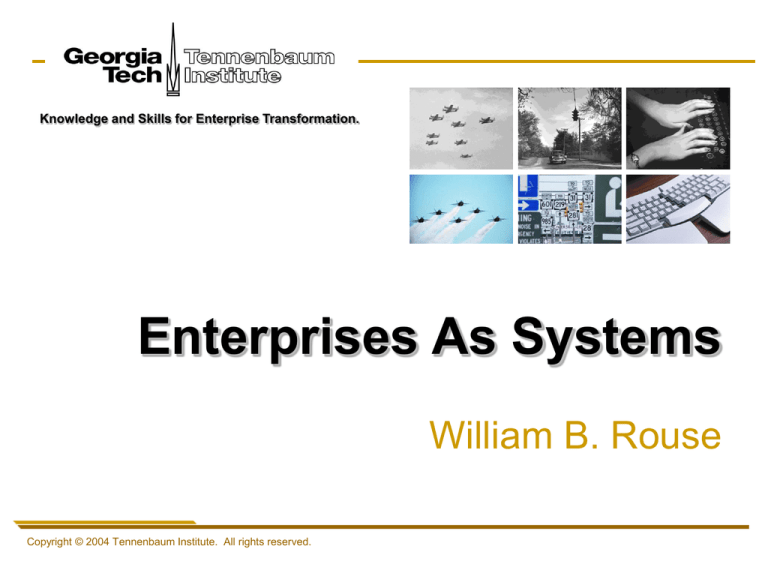
Knowledge and Skills for Enterprise Transformation.
Enterprises As Systems
William B. Rouse
Copyright © 2004 Tennenbaum Institute. All rights reserved.
Overview
• Definitions & Examples
• Enterprise Challenges
• Enterprise Transformation
– Perspectives
– Approaches
– Solutions
• Research Issues
–
–
–
–
–
–
–
Transformation Questions
Best Practices
Methods & Tools
Enterprise Technologies
Organizational Simulation
Investment Valuation
Organizational Culture & Change
Knowledge and Skills for Enterprise Transformation.
2
Enterprise Definitions
• Enterprise: A goal-directed organization of
resources -- human, information, financial, and
physical – and activities, usually of significant
operational scope, complication, risk, and
duration
• Other definitions:
– A venture, particularly one of some scope, complication,
and risk
– A purposeful or industrious undertaking, especially one
that requires effort or boldness
– Industrious, systematic activity, especially when directed
toward profit
Knowledge and Skills for Enterprise Transformation.
3
Statutory Definition
``Enterprise'' means the related activities performed (either through unified
operation or common control) by any person or persons for a common business
purpose, and includes all such activities whether performed in one or more
establishments or by one or more corporate or other organizational units including
departments of an establishment operated through leasing arrangements, but shall
not include the related activities performed for such enterprise by an independent
contractor: Provided, That within the meaning of this subsection, a retail or service
establishment which is under independent ownership shall not be deemed to be so
operated or controlled as to be other than a separate and distinct enterprise by
reason of any arrangement, which includes, but is not necessarily limited to, an
agreement (1) that it will sell, or sell only, certain goods specified by a particular
manufacturer, distributor, or advertiser, or (2) that it will join with other such
establishments in the same industry for the purpose of collective purchasing, or (3)
that it will have the exclusive right to sell the goods or use the brand name of a
manufacturer, distributor, or advertiser within a specified area, or by reason of the
fact that it occupies premises leased to it by a person who also leases premises to
other retail or service establishments.
Knowledge and Skills for Enterprise Transformation.
4
Enterprise Examples
•
•
•
•
•
•
•
Proprietorship – Single Owner, Location
Company – Single Business Unit
Corporation – Multiple Business Units
Supply Chain – Supply, Mfg, Distribution
Market – Competing Supply Chains
Government – Laws, Taxation, Services
Economy -- Markets & Governments
Knowledge and Skills for Enterprise Transformation.
5
Enterprise Challenges
•
•
•
•
Underlying Phenomena
Strategic Management
Nature of Challenges
Relationships Among Challenges
Knowledge and Skills for Enterprise Transformation.
6
Underlying Phenomena
• Most enterprises face similar challenges, although
relative importance varies
• Success of enterprises, and their leaders, strongly
affected by these challenges
• Multiple useful ways to address strategic challenges
successfully
• True nature of strategic challenges not determined by
tools chosen to address them
Knowledge and Skills for Enterprise Transformation.
7
Focus
Change
Growth
Markets
Organizations
Strategic
Management
Risks
Future
Value
Resources
Knowledge
Knowledge and Skills for Enterprise Transformation.
Time
8
Nature of Challenges
Challenge
Nature
Growth
Increasing Impact in Saturated/Declining Markets
Value
Enhancing Relationships of Processes to Benefits & Costs
Focus
Pursuing Opportunities & Avoiding Diversions
Change
Competing Creatively While Maintaining Continuity
Future
Investing in Inherently Unpredictable Outcomes
Knowledge
Transforming Information to Insights to Programs
Time
Carefully Allocating the Organization’s Scarcest Resource
Knowledge and Skills for Enterprise Transformation.
9
Goal
Growth
Design
Change
Focus
Time
Knowledge
Future
Path
Self
Means
View
Value
Foundation
Knowledge and Skills for Enterprise Transformation.
10
Enterprise Transformation
•
•
•
•
Framework
Examples
Perspectives
Approaches
Knowledge and Skills for Enterprise Transformation.
11
Transformation Framework
Knowledge and Skills for Enterprise Transformation.
12
Examples
•
•
•
•
Changing Markets
Changing Offerings
Changing Perceptions
Changing Operations
Knowledge and Skills for Enterprise Transformation.
13
Ends: Changing Markets
•
•
•
•
•
•
Amazon leveraging IT to redefine book buying
DoD adopting effects-based planning & acquisition
e-Bay leveraging IT to redefine the resale market
FedEx defining the overnight mail market
NCR leveraging IT to redefine banking (via ATMs)
Wal-Mart leveraging IT to redefine the retail industry
Knowledge and Skills for Enterprise Transformation.
14
Ends: Changing Offerings
•
•
•
•
•
•
•
CNN redefining news offerings
GE moving from products to financing
Home Depot redefining hardware store offerings
HP attempting to redefine offerings in the printer market
IBM defining the business PC market (via outsourcing)
Motorola moving from radios to cell phones
Schwab redefining how people buy securities
Knowledge and Skills for Enterprise Transformation.
15
Ends: Changing Perceptions
• Dell repositioning computer buying (via build to order)
• Interface adopting green practices to reposition
carpet buying
• Southwest repositioning discount air travel
• Starbucks repositioning coffee buying
• Victoria’s Secret repositioning lingerie buying
Knowledge and Skills for Enterprise Transformation.
16
Ends: Changing Operations
• American Cancer Society consolidating &
integrating operations
• Lockheed Martin merging three aircraft
companies
• Newell Rubbermaid resuscitating home
products companies
• Nucor decreasing the cost of steel making
(via mini-mills)
• Tennenco resuscitating Pemco
Knowledge and Skills for Enterprise Transformation.
17
Transformation Perspectives
• Market and/or technology opportunities – the lure of
greater success prompts transformation initiatives
• Market and/or technology threats – the danger of
pending failure prompts transformation initiatives
• Competitors’ initiatives – others’ transformation
initiatives prompt recognition that transformation is
necessary to continued success
• Enterprise crises – steadily declining market
performance, cash flow problems, etc. prompt
recognition that transformation is necessary to survive
Knowledge and Skills for Enterprise Transformation.
18
Transformation Approaches
• Strategy Oriented
– Markets Targeted, e.g., Global
– Market Channels Employed
– Value Proposition, e.g., Solutions
– Offerings – Products & Services
• Operation Oriented
– Supply Chain Restructuring
– Outsourcing & Offshoring
– Process Standardization
– Process Reengineering
– Web-Enabled Processes
Knowledge and Skills for Enterprise Transformation.
19
Enterprise Solutions
•
•
•
•
•
ERP: Enterprise Resource Planning
MRP: Materials Resource Planning
CRM: Customer Relationship Mgt.
SCM: Supply Chain Management
SFA: Sales Force Automation
Knowledge and Skills for Enterprise Transformation.
20
Research Issues
•
•
•
•
•
•
•
Transformation Questions
Best Practices
Methods & Tools
Enterprise Technologies
Organizational Simulation
Investment Valuation
Organizational Culture & Change
Knowledge and Skills for Enterprise Transformation.
21
Transformation Questions
•
•
•
•
•
What Are the “As Is” and “To Be” Enterprises?
What Are the Drivers and Enablers of Change?
What Will Change Be Like? How Will It Feel?
What Will Change Cost? What Will It Be Worth?
How Will We Implement Change? What Are the
Challenges?
• Which Practices Are Best? Which Are Worst?
Knowledge and Skills for Enterprise Transformation.
22
Best Practices Research
• Identification of Transforming Companies
– Dynamic Filtering of Financial Filings
– Review of Corporate Case Studies
• Comparison of Transformers to Sectors
– Financial Performance
– Nature of Initiatives
• Evaluation of Practices
– Best Practices
– Worst Practices
Knowledge and Skills for Enterprise Transformation.
23
Methods & Tools
• Models
– Formal Modeling of Organizations & Workflow
• Methods
– e.g., Lean, Six Sigma, BPR, TQM
• Systems
– e.g., ERP, CRM, SCM, SFA
• Enterprise Transformation: Understanding and
Enabling Fundamental Changes of Business
Strategies, Processes, and Cultures
Knowledge and Skills for Enterprise Transformation.
24
Enterprise Technologies
• Concepts
– Mobile & Virtual Enterprises
• Functions
– Knowledge Mgt, Collaboration, Identity Mgt
• Technologies
– Agents, Biometrics, PKI, RFID
• Organizational & Policy Implications
– Interoperability, Security, Privacy, Cost of Ownership
Knowledge and Skills for Enterprise Transformation.
25
Organizational Simulation
• Simulating Organizational Futures
– Immersive, Interactive Experiences
– Building on Games, Entertainment, Etc.
– “Drive the Future Before You Write the Check”
• Projects
– R&D World
– Office World
– Infrastructure World
– Lion City
• Organizational Simulation: From Modeling &
Simulation to Games & Entertainment
Knowledge and Skills for Enterprise Transformation.
26
Investment Valuation
• “Big Bet” Investments
– Science & Technology
– Mergers & Acquisitions
– Economic Development
• Long-Term, Highly Uncertain Returns
– Technology Risks
– “Market” Risks
• Investments as Options
– R&D World
– New Analytic Models
Knowledge and Skills for Enterprise Transformation.
27
Organizational Change
• Understanding Fundamental Change in
Context of Other Research Initiatives
• Forces & Triggers of Transformation
– Intentional Changes
– Emergent Changes
• Case Studies of Change
– Retail Industry
– Commodity Industries
– Value-Centered R&D Management
Knowledge and Skills for Enterprise Transformation.
28
Enterprise Systems Research
Practices
Investment
Valuation
Practices
Knowledge and Skills for Enterprise Transformation.
Methods &
Tools
Organizational
Culture & Change
Organizational
Simulation
Practices
Enterprise
Technologies
Practices
29
Transformation Questions
•
•
•
•
•
What Are the “As Is” and “To Be” Enterprises?
What Are the Drivers and Enablers of Change?
What Will Change Be Like? How Will It Feel?
What Will Change Cost? What Will It Be Worth?
How Will We Implement Change? What Are the
Challenges?
• Which Practices Are Best? Which Are Worst?
Knowledge and Skills for Enterprise Transformation.
30
Knowledge and Skills for Enterprise Transformation.
31

